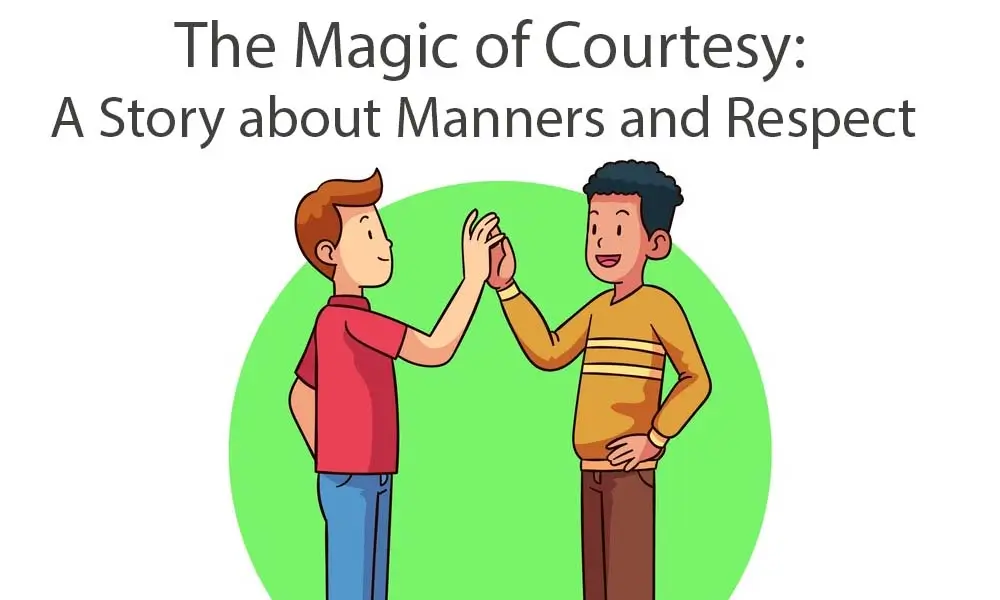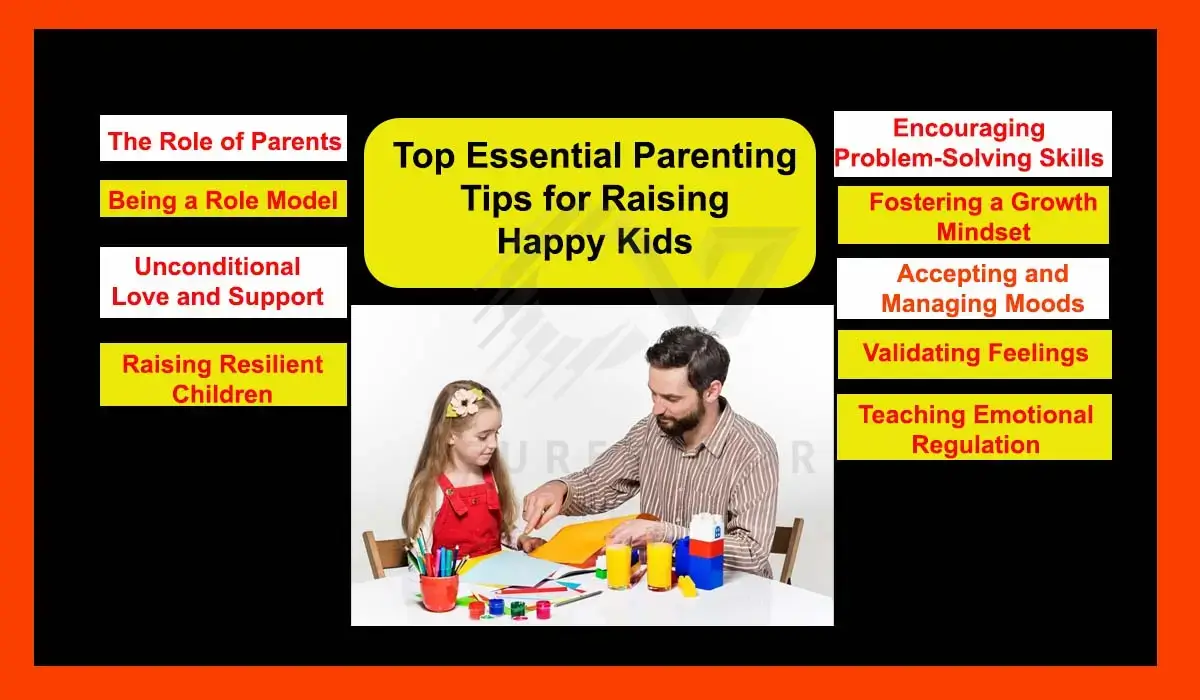Come into the story of respect, courtesy, manners, and the magic in the world. The Magic of Courtesy features timeless good manners and respect. Indeed, the whole town rises and feels hope when just one family commits itself to these values. Discover the magic of kindness!
Contents
- 1 How to get Manners and Respect
- 1.1 The Youngest Learns First
- 1.2 A Father’s Gentle Leadership
- 1.3 The Graceful Mother
- 1.4 The Wise Grandparents
- 1.5 A Town Transformed
- 1.6 Conclusion on Respect and Gourtesy
- 1.7 FAQs on Respect and Manners
- 1.7.1 Q. What mainly does “The Magic of Courtesy: A Story about Manners and Respect” teach?
- 1.7.2 Q. What role do the various characters play in advancing the notion of decency and civility?
- 1.7.3 Q. How does the story show how good manners affect the community?
- 1.7.4 Q. Why do good manners matter in everyday life, says the fable?
- 1.7.5 Q. How does “The Magic of Courtesy” teach the value of listening as part of good manners?
Characters
- Lily Rivers (5 years old)
Characteristics: Bright, curious, and ever-ready to lend a helping hand. Lily is quick to respond with courtesy and helpfulness to strangers as well. She knows that even small acts of courtesy can make a difference.
- Michael Rivers (Father, 35)
Characteristics: calm, collected, and considerate. As a high school teacher, Michael feels that students must have dignity equal to what he expects. He tackles conflict with poise and subtle, decisive leadership.
- Emily Rivers (Mother, 33)
Characteristics: Emily is warm, generous, and a good listener. She is the heartbeat of the family, ever willing to lend an ear or a helping hand in a hurting moment. She believes everyone deserves to feel important and heard.
- George Rivers (Grandfather, 70 years old)
Characteristics: George is wise, compassionate, and experienced. He has been a practicing doctor all his life and believes that respect and kindness are the best forms of healing.
- Martha Rivers (Grandmother, 68 years old)
Characteristics: Patient, loving, and nurturing. Martha raised five children and is very confident in the effectiveness of patience. She encourages her family to have mercy on themselves and others during trying times.
How to get Manners and Respect
In the small town of Willowbrook, a family was so full of kindness and good manners that their good deeds were heard miles away. The Rivers family was a three-generation family entity that lived off the foundation of respect, friendship, and understanding.
It did not matter whether you were the youngest child or the oldest grandparent; each Rivers person embodied courtesy. However, as it was about to see, the town held an enormous power beyond anyone’s imagination. It is the story of how one family, through their gracious behavior, taught an entire town the true magic of courtesy.
The Youngest Learns First
The family’s youngest member was Lily Rivers, who was five years old. She was bright and curious and loved stories and learning about them. What made Lily unique to all her counterparts was a significant gift: impeccable manners. While her friends learned simple phrases like “please” and “thank you,” she understood manners beyond that.
One sunny afternoon, Lily was playing in the park when she noticed another child, Timmy, having difficulty tying his shoelaces. She did not think twice, approached him, and asked with a smile, “Do you want some help? I’d be happy to teach you how to tie them.”
Timmy, surprised by her kindness, nodded. After she helped him, Timmy asked, “Why are you so nice to me? I don’t even know you.”
Lily smiled. “My parents say being kind to others is the best way to make friends. It doesn’t matter if we don’t know each other; everyone deserves kindness.”
Timmy, touched by her words, felt warmth he hadn’t felt before. Lily’s small act of courtesy impacted him, and he began to see the importance of being kind to others.
A Father’s Gentle Leadership
Lily’s father, Michael Rivers, is a quiet dignitary. He teaches in the local high school, and many students exclaim how he would successfully handle the most turbulent classroom without ever raising his voice. Michael says that respect is two-way traffic. He treats his students with the respect he wants them to use toward him.
One day, a student stormed into Michael’s class, furiously complaining about the grade he had gotten on an assignment. He started shouting at Michael, demanding that grade. The other kids held their breath, expecting this outburst of anger that they knew would indeed explode.
But instead, Michael calmly approached the situation and said, “Jake, I can see that you’re upset. And that’s understandable. I also understand why this grade is important to you now. Let us sit down and talk it out. I am sure we can work something out between us.”
Stunned by Michael’s calm and respectful tone, Jake sat. As Michael discussed the problem with him, Jake realized he had wasted his anger because Michael’s grading hadn’t mistreated him. Michael’s patience and respect neutralized the situation, and Jake walked out of the class with a new admiration for the teacher.
The Graceful Mother
Emily Rivers, the family matriarch, was known throughout Willowbrook for her warmth and generosity. She volunteered at the community center, organized charity drives, and always made time for a needy neighbor. However, what people admired most about Emily was her ability to listen.
One day, while cooking in the evening, Emily received a call from her aged neighbor, Mrs. Harper. Mrs. Harper used to get lonely most of the time and would often telephone Emily to talk with her. Although Emily was busy cooking, she never hurried the conversation, making Mrs. Harper feel burdensome.
“Thank you for listening, Emily,” Mrs. Harper said softly, her voice full of gratitude. “You always make me feel important, even when I am sure you have far better things to do.”
Emily smiled, though Mrs. Harper could not see it. “You are always important, Mrs. Harper. It is no trouble at all to listen. Everyone deserves to feel heard.”
That night, when Emily sat down with her family for dinner, she realized that listening, for instance, might be one of those little acts of courtesy that could determine somebody’s world.
The Wise Grandparents
The grandparents, George and Martha Rivers, were poles of this family. They constitute the Rivers’s pillars and propagate knowledge, tolerance, and a lifetime of lessons in compassion.
George, a retired physician, believed that the most basic and critical part of caring for people was treating them with dignity. He never failed to recount stories to his grandkids about all of his patients and how sometimes the best treatment was not in a bottle but in a loving word or an act of compassion.
In contrast, Martha was a patient person. Once she had her five children, she determined that patience was one of the most beautiful interpretations of love. She would take her grandkids down, sit them in her eyes, and say, “Everyone does wrong, but it’s how you respond that makes you a person,” rather than scolding them for their mistakes. You can always find your way around a situation if you are patient with yourself and other people.
A Town Transformed
The influence of the Rivers family over Willowbrook was not noticeable at first. The changes were felt over time. Neighbors started to offer more support to each other and greet amicably. Lily inspired kids in the park to share their toys, and Michael’s students became more considerate and tolerant of one another. After seeing Emily’s kindness, the busiest neighbors could make time to talk to the lonely or assist as needed.
The magic of courtesy took root in Willowbrook, and shortly, the town became the town’s talk, famous for its warm and friendly face. People sometimes commented on how welcome individuals were, unaware that it all came down to simple daily actions by one family.
Conclusion on Respect and Gourtesy
The Rivers family of Willowbrook taught that good manners and respect are not just the right words. They meant listening to someone who needed to be heard, patience in trying situations, lending a hand as needed, or, above all, treating every individual, without regard for age or status, with dignity. Courtesy, they proved, can change the individual and the whole town.
Moreover, the Rivers family reminded the world that kindness is a language everybody understands, and speaking it creates magic.
FAQs on Respect and Manners
These FAQs dig even deeper into the themes, characters, and lessons in the story “The Magic of Courtesy,” making some critical themes related to manners and respect that profoundly impact people’s lives and societies.
Q. What mainly does “The Magic of Courtesy: A Story about Manners and Respect” teach?
In “The Magic of Courtesy,” the theme is how transformative respect and good manners are. The story shows how everyday acts of kindness and courtesy, like helping others, listening, being patient, and showing respect to others, can help families, communities, and more. The good deeds of the Rivers family exemplify how treating people with respect is not just about using polite words. The power of civility rests in its ability to improve communication, resolve conflicts, and build a peaceful community.
Q. What role do the various characters play in advancing the notion of decency and civility?
Every member of the Rivers family contributes to a theme of decency and respect in the story. Lily Rivers represents the innocence and goodness of young people. Her little acts of kindness, such as tying up a friend’s shoelaces, show that even younger individuals can have a significant effect.
The father in the movie, Michael Rivers, seems to be a model of tolerance and a respectful person unto others; he teaches his children that one’s composure and compassion, rather than force or might, work for one to earn respect.
With her motherly love and the power of listening, Emily Rivers shows how the other person feels valuable. Taking time from her busy schedule to talk to an elderly neighbor teaches respect—not mere words but making time for people.
George Rivers, the grandfather, was wise and long, showing how kindness heals emotional wounds. His being a retired doctor depicted respect for everyone of whatever status, showing that equality is necessary for kindness.
Martha Rivers, the grandmother, was patient and taught her family to be soft and gentle with themselves and others. Her phrase, “Never mind mistakes; mistakes are lesson levers,” further explained that respect also consists of self-compassion.
Q. How does the story show how good manners affect the community?
The story illustrates that the courteous behavior of the Rivers family does not influence only those in their household, but the whole town of Willowbrook is affected. Some actions seem very small, like helping a neighbor, calming a student, or just hearing someone out, but these inspire others over time.
For example, when the playing session in the park is over, and Lily helps Timmy, the other children start to share and cooperate. A. Michael’s gentle, respectful attitude toward his students brings greater understanding and patience to the class. Little does Emily generously express her thoughts, which inspires the community members to love others. Gradually, the town of Willowbrook earns a reputation for friendliness, consideration, and respect, showing how politeness can transform whole communities into being themselves, the embodiment of mutual comprehension and benevolence.
Q. Why do good manners matter in everyday life, says the fable?
The story reveals that good manners help build intense, meaningful relationships. Being polite and friendly on the surface is not a characteristic of good manners. All affairs, whether with family, friends, or people you will never see again, require showing respect, patience, and understanding.
As seen in “The Magic of Courtesy,” there is evidence that the good manners involve:
- Conflict resolution without anger, such as Michael, is demonstrated by creating calmness and respect to diffuse the student’s frustration.
- Engender trust and frankness are exemplified by Emily’s stopping to listen to her elderly neighbor.
- Develop friendships and relationships, as with Lily’s friendly act toward another child in the park.
- Create respect for the self and growth for the individual, as Martha taught her grandkids—that mistakes are learning experiences, not humiliations.
- Following courtesy regularly develops an atmosphere of pleasing, teamwork, and respect for one another.
Q. How does “The Magic of Courtesy” teach the value of listening as part of good manners?
Overall, the story is about the character of Emily Rivers, who epitomizes the qualities of giving people the ample time and attention they require. Listening becomes the central theme of this story. When Emily finds time to hear her old neighbor, Mrs. Harper, despite her heavy schedule, she expresses a powerful idea that something that can make others feel important and heard is just listening.
The moral of the story is listening, rather than the process of hearing what the other person has to say, but instead making others feel important and heard. Then again, it is in Emily’s story that listening to others will help build stronger bonds between us and validate their sentiments.
Conflict resolution largely depends upon the ability to listen, as is demonstrated when Michael continually lets his angry student vent without interrupting or trivializing what he is saying. This gracious act converts a potentially heated discussion into a constructive conversation. As this story holds, listening is one of the most potent acts of civility because it manifests empathy, understanding, and respect.
Read more stories and articles about health and wellness.
You might like to read:










